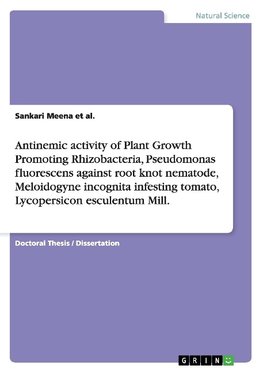
-
 Anglický jazyk
Anglický jazyk
Antinemic activity of Plant Growth Promoting Rhizobacteria, Pseudomonas fluorescens against root knot nematode, Meloidogyne incognita infesting tomato, Lycopersicon esculentum Mill.
Autor: Sankari Meena Et Al.
Doctoral Thesis / Dissertation from the year 2010 in the subject Biology - Genetics / Gene Technology, grade: 94.30, Tamil Nadu Agricultural University, course: Plant Nematology, language: English, abstract: Tomatoes (Lycopersicon esculentum) are origin... Viac o knihe
Na objednávku
25.92 €
bežná cena: 28.80 €
O knihe
Doctoral Thesis / Dissertation from the year 2010 in the subject Biology - Genetics / Gene Technology, grade: 94.30, Tamil Nadu Agricultural University, course: Plant Nematology, language: English, abstract: Tomatoes (Lycopersicon esculentum) are origin of South America and were first used as food in Southern Mexico. Since the fruit has seeds and grows from flowering plant, botanically it is classified under fruits. It is the state vegetable of New Jersey and official state fruit of Ohio and its juice is the official beverage of Ohio.The fruit is rich in lycopene which is an antioxidant found to be good for the heart and effective against certain cancer diseases. Also the fruits are rich in vitamin A and C, calcium and potassium. The best sources of lycopene are found in processed tomato products. Eighty per cent of the tomatoes harvested are industrially processed. Increase in demand of the processed products of tomato in domestic and international markets make an upward trend in the cultivation of this crop. Now days, tomatoes are important ingredient in pizza and pasta sauces. High acidic content in the fruit makes it a prime candidate in the canning industries.The factors that are attributed for the reduction of fruit yield of the crop include both biotic and abiotic stresses. Among the biotic stresses, plant parasitic nematodes play a major role in reducing the crop yield as tomatoes are excellent host for the nematodes. In general, Crop loss due to these nematodes worldwide was estimated to be greater than 11 per cent and among vegetables, infestation of root knot nematode contributes major loss for the crops (Ayyar, 1926).
Annual yield loss of crops due to plant parasitic nematodes have been estimated about dollar 78 billion worldwide and dollar 8 billion for US growers. In Tamil Nadu, the loss incurred was estimated about Rs. 200 crores (Jonathan et al., 2005).Generally, nematode management success over a long term requires several alternatives and integration of approaches which should be economically feasible. This is especially true for horticultural crops. Therefore, safe and alternative methods for managing plant parasitic nematodes in horticultural crops are critically needed for the development of sustainable cropping systems.
A promising alternative is the use of microbial antagonists against plant parasitic nematodes which are ecofriendly and economically feasible and it does not allow the nematodes to develop into new races or biotypes.In addition to that, they are easily amenable for mass production, formulation technology and easy to deliver in the field.
- Vydavateľstvo: GRIN Verlag
- Rok vydania: 2014
- Formát: Paperback
- Rozmer: 210 x 148 mm
- Jazyk: Anglický jazyk
- ISBN: 9783656747963












